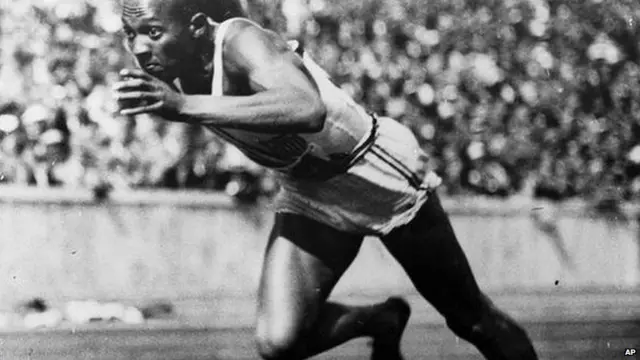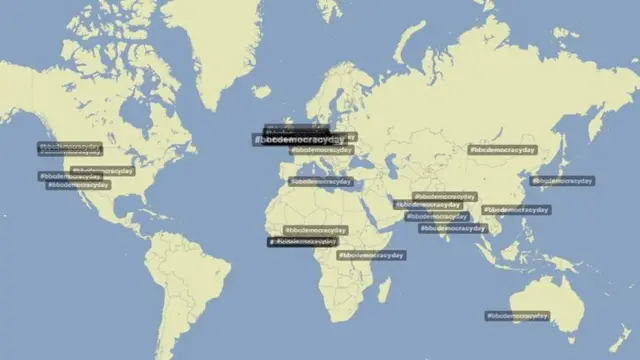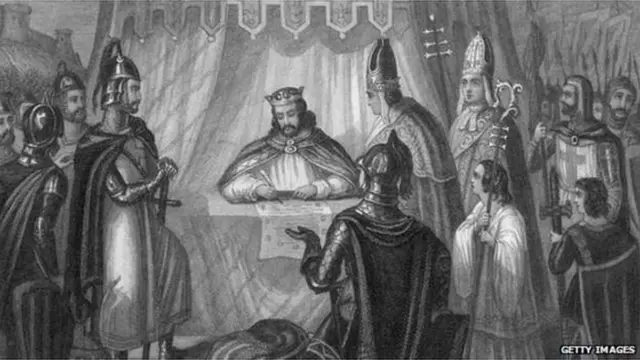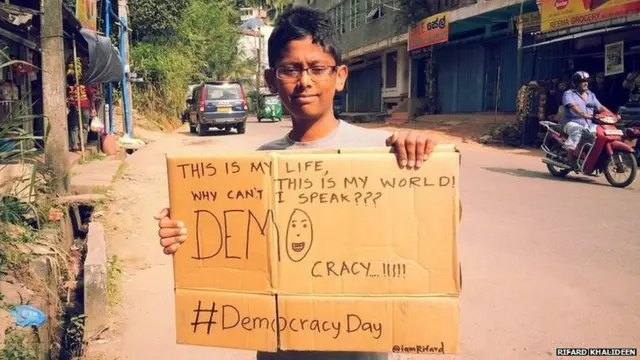Postpublished at 10:59 GMT 20 January 2015
BBC Africa tweets, external Follow #BBCDemocracyDay to participate in our debate on the question: Is Africa re-inventing democracy? Use this hashtag to send comments.
20 January 2015 marks the 750th anniversary of the first parliament of elected representatives at Westminster, the de Montfort Parliament
50 years earlier Magna Carta - or the Great Charter - was sealed by King John in 1215 and established for the first time that everyone, including him, was subject to law
The BBC is broadcasting a day of live events, discussion and debate broadcast from inside Westminster and the BBC Radio Theatre
Highlights include an interview with the inventor of the World Wide Web, Sir Tim Berners Lee; live streaming of BBC News meetings; and panel debates from inside the Radio Theatre
Democracy Day is produced in collaboration with the House of Commons and the House of Lords
Anna Browning, Holly Wallis, Laurence Peter, Alison Daye and Paul Harrison
BBC Africa tweets, external Follow #BBCDemocracyDay to participate in our debate on the question: Is Africa re-inventing democracy? Use this hashtag to send comments.
Graham Hodgin emails: Democracy, yes! But How to implement it? Parliamentary Democracy increasingly looks less and less democratic. We need a broader debate.
Poet and activist Shurooq Amin tweets, external Democracy is more than just a #vote. It is rule of law, freedom of expression & media, minority rights, etc. #DemocracyDay @BBCWomansHour
Coming up next in the BBC Radio Theatre at 11:00 GMT: Is Africa reinventing democracy? You can watch a live webcast here on our live page.
Panellists include Ghanaian opposition leader Nana Akufo-Addo and DR Congo's Katanga Province Governor Moise Katumbi.
Woman's Hour hears from members of the Girl Guides - who have introduced a Parliament badge to encourage girls to talk about politics. One Girl Guide, Olivia, tells the programme that most girls at her school do not know much about politics.
Guests on Woman's Hour argue that Western-style democracy cannot be imposed everywhere across the world - first nations need certain institutions and standards.
 Image source, AP
Image source, APThe BBC's Dan Roan finds out whether democracy matters in sport? Above is a picture of Jesse Owens, whose success dented Hitler's attempt to use the Berlin Games for propaganda purposes.
A spokeswoman for the No More Page Three campaign group - which has pushed for removing the pictures of topless women in The Sun newspaper - says it is amazing how many young women have been involved in the drive. Three girl guides are also weighing in on the discussion.
Helen Pankhurst, granddaughter of Suffragette Sylvia Pankhurst and great-granddaughter of Emmeline, welcomes the rise of single issue campaigns, on Women's Hour. Women are saying "it's not good enough and we are going to change things".

Looks like the BBC's democracy day has struck a chord - worldwide. Look at this map, to see where the twitter hashtag #bbcdemocracyday is trending
David Bowes from Middlesbrough emails: Change the voting system. FPTP is archaic, not representative of the increasingly 'switched on and distrusting electorate', it's eroding democratic credibility of Westminster. Blair in particular wielded enormous power with a relatively low share of the overall vote. 'Safe seats' under FPTP are destructive to democracy and leave huge numbers of voices and opinions not represented.
Radio 4's Woman's Hour is hearing about the involvement of medieval women in the development of Parliament.
Some closing comments from the democracy panellists:
Douglas Carswell MP: Optimistic, because the internet will help the public to hold politicians to account.
Ken Clarke MP: Optimistic, because the system hasn't failed.
The live debate from the BBC Radio Theatre is now over.
is celebrating BBC Democracy Day on Twitter too. @janegarvey1's discussing what democracy means to you. Do you vote? Do you care? Why? Get in touch @BBCWomansHour., external
 Image source, Getty Images
Image source, Getty ImagesAs the BBC examines democracy in the UK and around the world, BBC Democracy Live has a live page looking at democracy through the ages, beginning with the signing of Magna Carta in 1215.
Susan Lodder emails: Democracy is not perfect but the alternative is unthinkable. Keep democracy alive and use your vote.
Nick Robinson asks Heba Raouf Ezzat (Egyptian activist): What is necessary to make democracy take root in Egypt?
She says: There's a rising disenchantment, and the youth should be listened to more. The political elite took over after the Tahrir protests. Old parties came back to negotiate, but youth were left out of the equation. In Tunisia the level of education is higher, the democracy index shows that smaller countries rank higher in democracy. In bigger countries the apparatus works differently.
Speaker of the House of Lords Baroness de Souza tells BBC Radio 4's Woman's Hour that the UK should be making it easier for women to enter the House of Lords.
 Image source, Rifard Khalideen
Image source, Rifard KhalideenWhat does democracy look like in 2015, and what part do protests play when people try to stand up for their rights? Have a look of the pictures sent in over the last week from the last week.
Audience member Rebecca Scott says: The main problem with referendums is the issues are often complex, the electorate doesn't always understand. The great success of the Scottish referendum was that the issues were explained well. You should give people enough time to have the issues explained.